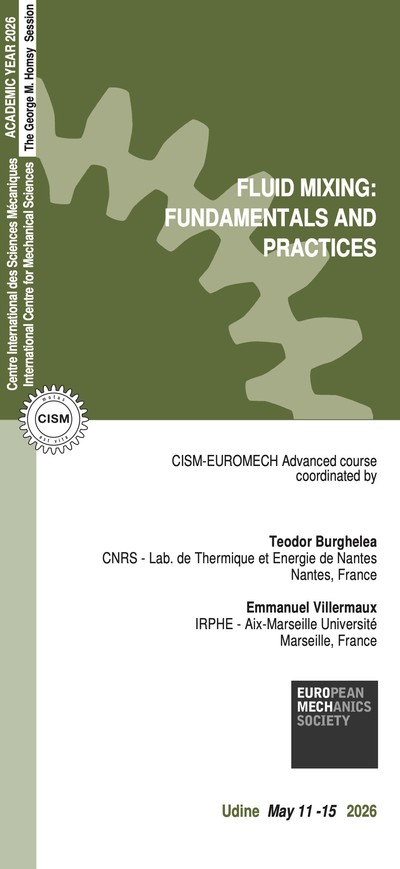Bertoldi, K., Gei M. (2011), Instabilities in multilayered soft dielectrics, J. Mech. Phys. Solids 59 (1), 18-42.
K. Danas (2017). Effective response of classical, auxetic and chiral magnetoelastic materials by use of a new variational principle, J. Mech. Phys. Solids, 105, 25-53.
Danas K., Kankanala S.V., Triantafyllidis N., (2012). Experiments and modeling of iron-particle-filled magnetorheological elastomers, J. Mech. Phys. Solids, 60, 120-138.
Fu, YB, Xie YX, and Dorfmann, L, (2018). A reduced model for electrodes-coated dielectric plates. Int. J. Non-linear Mech. 106, 60-69.
Keip, M.-A., & Rambausek, M. (2017). Computational and analytical investigations of shape effects in the experimental characterization of magnetorheological elastomers. International Journal of Solids and Structures, 121, 1-20.
Lefèvre, V., Lopez-Pamies, O. 2017. Nonlinear electroelastic deformations of dielectric elastomer composites: I — Ideal elastic dielectrics. J. Mech. Phys. Solids 99, 409–437.
Lefèvre, V., Lopez-Pamies, O. 2017. Nonlinear electroelastic deformations of dielectric elastomer composites: II — Non-Gaussian elastic dielectrics. J. Mech. Phys. Solids 99, 438–470.
Meddeb, A.B., Ounaies, Z., Lopez-Pamies, O. (2019). Interfacial effects on the electrical behavior of elastomer nanoparticulate composites, Behavior and Mechanics of Multifunctional Materials XIII 10968, 109680I.
Meddeb, A.B., Tighe, T., Ounaies, Z., Lopez-Pamies, O. (2019). Extreme enhancement of the nonlinear elastic response of elastomer nanoparticulate composites via interphases, Comp. Part B: Engineering 156, 166-173.
Psarra E., Bodelot L., Danas K. (2017). Two-field surface pattern control via marginally stable magnetorheological elastomers, Soft Matter, 13 (37), 6576-6584.
6 lectures on: magnetoactive soft solids, phenomenological modeling of magneto-elasticity, balance principles (momenta and Maxwell), macroscopic and homogenization modeling and experiments of magnetorheological elastomers (MREs), including instabilities on MRE film/substrate systems, modeling of magnetic hysteresis and h-MREs.
6 lectures on: analytical methods for studying periodic and localized buckling patterns, and explain how the methods can be used to study the wrinkling and necking of dielelectric thin sheets under general electromechanical loading conditions.
6 lectures on: the phenomenological and micromechanical modeling and stability of dielectric elastomers and dielectric elastomer composites (DECs). He will also present an analysis of the features of different types of devices made up of dielectric elastomers: actuators and mechanical-to-electrical energy converters for energy harvesting purposes.
6 lectures on: the continuum-mechanical modeling and numerical simulation of magneto-electro-mechanically coupled boundary value problems across length scales, first-order computational homogenization strategies, material and structural stability analysis, and phase-field modeling of microstructures at finite deformations.
6 lectures on: on fundamentals of electro-magneto-elasticity, homogenization of electro-magneto-elastic composites at small and finite deformations, analytical and numerical methods for homogenization in MREs and DECs (with and without space charges), comparisons between homogenization-based theoretical results and experiments.
4 lectures on: the state-of-the-art fabrication and characterization methods for DECs and MREs featuring nano- and micro-structures, micro- and nano-particulate composites with controlled particle-matrix interfaces, and a broad range of experimental techniques that probe transport mechanisms and dielectric relaxations in the DECs and MREs.
The registration fee is 600.00 Euro + VAT*, where applicable (bank charges are not included). The registration fee includes a complimentary bag, four fixed menu buffet lunches (on Friday upon request), hot beverages, downloadable lecture notes and wi-fi internet access.
Applicants must apply at least one month before the beginning of the course. Application forms should be sent on-line through the following web site: http://www.cism.it. A message of confirmation will be sent to accepted participants. Applicants requiring assistance with the registration should contact the secretariat at the following email address cism@cism.it.
Applicants may cancel their course registration and receive a full refund by notifying CISM Secretariat in writing (by email to cism@cism.it) no later than two weeks prior to the start of the course.
Cancellation requests received during the two weeks prior to the start of the course will be charged a 50.00 Euro handling fee. Incorrect payments are also subject to a 50.00 Euro handling fee.
A limited number of participants from universities and research centres who are not supported by their own institutions can be offered lodging and/or board, if available, in a reasonably priced hotel or student guest house.
Requests should be sent to CISM Secretariat by April 8, 2020 along with the applicant's curriculum and a letter of recommendation by the head of the department or a supervisor confirming that the institute cannot provide funding. Preference will be given to applicants from countries that sponsor CISM.
Information about travel and accommodation is available on the web site www.cism.it, or can be mailed upon request.
* Italian VAT is 22%.





